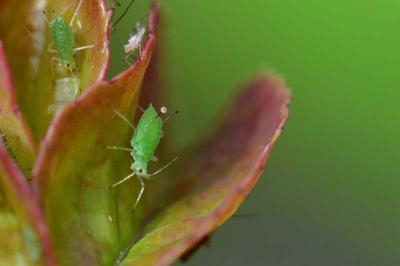
an aphid infestation starts with just one aphid
Most species of succulent such as Jade Plant, Agave, or Crassula Tetragona are tough and will survive on a strong heat of summer. They are drought-tolerant that doesn’t need a lot of maintenance. These plants will thrive even if you water it once a week, just make sure the soil will drain well to avoid its roots from rotting.
Despite being tough, some species of succulent like Echeveria are susceptible to pest such as aphids. These tiny insects are known to be a pest of different kinds of plants, one of them are succulents. They harm, prevent the growth or even kill your plant if left untreated.
These insects damage the plant by sucking the life out of it. Some of them even carry viruses which can spread easily. The plant that infested by this insect usually has a sticky residue called “honeydew”.
This residue encourages the formation of sooty mold – a fungal infection, that can damage the succulent further by obstructing the light and photosynthesis.
Symbiotic Relationship Of Ants And Aphids
Some species of ants protect the aphids from predators. Generally, they defend these insects for their honeydew. The ants release a chemical which makes the aphids calm and keeps them from going away. Whenever other insects approach the aphids, the ants fight them to protect their herd.
The ants are also known to prevent the aphids from flying away. They bite off its wings to continue milking its honeydew even if that plant is already weak and dying. This reason makes the ants another problem in your succulent since they do not stop until there’s a sap left that aphids can suck.
Gentle Ways Of Keeping Aphids Away From Your Succulents
If your succulent has ants on it, you can start by tracing where they are coming from. Follow and trace them until you find the location of the anthill. A simple way of killing ants is pouring hot water into its colony.
You can also use nematodes to get rid of them. They are organic and garden-friendly that works best against insects. Once they’re gone, you can start getting rid of aphids.
During hot seasons, most aphids on succulents will die on their own. So, you don’t really need to use pesticides for them since their numbers will drastically decrease. Using a strong jet of water may be enough to remove these pests.
However, if the aphid infestation is severe, you can wash them using a detergent. Keep in mind that you cannot use regular soap that you can find in your kitchen. You need to use an organic one such as Castile. This detergent has animal fat and vegetable oils which is safe for your plants.
To prepare this, placed at least three-tablespoon in the spray bottle then mix it with warm water. Now, spray it to your succulent especially the infested part to wash the aphids away.
Using Plants That Naturally Repel Aphids
Using another method such as companion planting will also prevent aphids from crawling your succulents. This technique is done by placing a plant nearby the succulent that aphids naturally doesn’t like.
Smelly plants such as onions and garlic will prevent this pest from coming around.
You can also plant a Lemongrass beside your succulent. The aphids won’t be able to tolerate the strong scent coming from this plant. This will serve as double-purpose since it can also repel insects such as flies and mosquitoes. You can also use it for cooking.
Peppermint is also good for deterring aphids however, it is recommended that you plant this on a pot since they are known as an invasive that grows fast and could take your garden easily.
Using plants that lure predator of aphids is another method of keeping these pests away from your succulent. For example, planting a sunflower will attract the ladybugs which feed on aphids. Marigolds are also good here since aphids do not like the smell coming from this plant while it attracts some of its predators.
Conclusion
Aphid infestation is a real problem, not only for succulents but also for the other plants. You need to treat your plant immediately before they started to multiply and suck your plant’s life.
With the methods above, you can prevent it from happening.
Bio
Kevin Piol
Gardening is my passion. Whenever I am free, I usually spent my time on backyard along with my wife and daughter. We love to grow different plants and vegetable every time! I also like DIY stuff in gardening such as creating an unusual container for plants that were made from recycled material. Without gardening my life would be different. It is more than a simple hobby. I also love sharing my knowledge of gardening; therefore, I created a blog which you can find here at Gardeners Guide.


